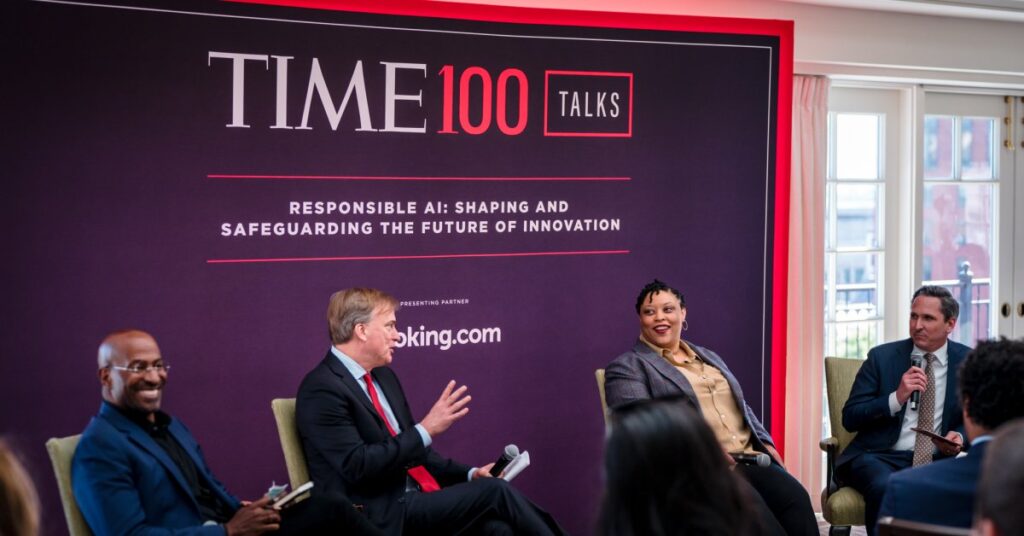Artificial intelligence is a touchy subject in Washington.
Although most lawmakers agree that they pose significant risks if left unregulated, there is still a lack of consensus on how to address these concerns. But on Friday, at the TIME100 talks held ahead of the White House Correspondents' Dinner, a panel of experts with backgrounds in government, national security, and social justice agreed that the final He expressed optimism that the U.S. government would “get it right.” Harness the benefits of AI while protecting against potential dangers.
“We can't afford to get this wrong again,” Sharanda Young, director of the Biden administration's Office of Management and Budget, told Time magazine's senior White House correspondent Brian Bennett. “Government was already behind the technology boom. Can you imagine if government were a user of AI and we would get it wrong?”
read more: A call to embrace AI – but with a “human touch”
Panelists agreed that government action is needed to ensure the United States remains at the forefront of safe AI innovation. But they noted that the rapidly evolving field raises a number of concerns that cannot be ignored, from civil rights to national security. “The code is starting to write the code, and it's going to make people very uncomfortable, especially in vulnerable communities,” said CNN host and social entrepreneur Dream Machine, a nonprofit that fights overcrowded prisons and poverty. Founder Van Jones says: . “When you have biased data coming in, the algorithms coming out are going to make biased decisions. That's the big fear.”
While the U.S. government may not have the best track record of keeping up with emerging technologies, there is recognition among lawmakers that understanding, regulating, and ethical governance of AI must be prioritized as it becomes increasingly pervasive. Young says it's on the rise.
Michael Allen, managing director of Beacon Global Strategies and former director of the National Security Council under President George W. He suggested that we need to ensure that humans are at the forefront. Any decision-making process that involves technology, especially when it comes to national security. “Ultimately it makes the most sense to convey information to humans,” he says.
Asked how Republicans and Democrats in Washington can talk about tackling the challenges and opportunities posed by AI, Young pointed to President Biden's signature CHIPS and Science Funding for Science Act. He said that bipartisan changes in science and technology policy have already taken place in recent years, leading up to the provision of funding. National Science Foundation. The common theme behind this resurgence of bipartisan support is a strong anti-China movement in Congress, she says.
“There's a lot of attention on China in the U.S. Congress,” Young said. “But we can't just focus on China and talk about the military. We have to talk about the economic and scientific competitive aspects of it. These things give us a bipartisan opportunity. We've created an environment where people can give back to us.”
Allen noted that in an era of geopolitical competition with China, the U.S. government needs to be at the forefront of artificial intelligence. He compared the current situation to the nuclear age, when the U.S. government was funding nuclear research. “Here, in this new atmosphere, the private sector is the main driver of all innovative technology,” Allen says. “The conventional wisdom is that the U.S. is in the lead, and we are still ahead of China. But when you start thinking about regulation, our adversaries are trying to move much further down the line in this area, so how can we do that?” I think the question will be whether the United States can remain at the forefront of artificial intelligence.”
Congress has yet to pass any major AI legislation, but that hasn't stopped the White House from taking action. President Joe Biden signs an executive order setting guidelines for tech companies training and testing AI models and requiring government agencies to vet future AI products for potential national security risks. instructed. Asked how quickly Americans can expect to see stronger guardrails around AI, Young said that some parts of Congress are working to inform lawmakers about AI without taking a political perspective and to seek legislative solutions. He noted that he is pushing for the creation of a new, independent federal agency that could provide assistance with the policy.
“If we don't get this right, how can we maintain trust in government?” Young said.
TIME100 Talk: Responsible AI: Shaping and Securing the Future of Innovation was hosted by Booking.com.


